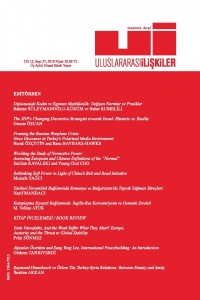Abstract
Bu makale, Çin’in yumuşak güç kullanarak nasıl farklı ülkelerin eski İpek Yolu’nu altyapı, ticaret, finans ve diğer bağlantılarla canlandırmayı amaçlayan Kuşak ve Yol Girişimi (KYG) projesinde yer almasını sağlamaya çalıştığını inceliyor. Yumuşak güce davranışsal ve bağlamsal bir açıklama getiren bu inceleme gösteriyor ki Çin devleti KYG için yumuşak güce dayalı bir ekonomik diplomasi faaliyeti gözetiyor ve bunun etkili olması için de sert güç kaynaklarına dayanıyor. Dahası, Çin diplomatik faaliyetlerinde küresel ekonomideki güç boşluğundan yararlanarak uluslararası sistem için liberal bir ekonomik vizyonu sahipleniyor ve yüksek ekonomik kalkınma seviyesine ulaşabilmek için küreselleşme, serbest ticaret, altyapı yatırımı ve kazan-kazan işbirliğinin önemini vurguluyor. Çin KYG’yi daha çok ekonomik kalkınma amacı çerçevesine sokarken, Çin’in diğer ülkelere olan yumuşak güç cazibesinin uluslararası sistemde önemli siyasi ve güvenlik sonuçlarına yol açması kuvvetle muhtemel.
References
- .......
Abstract
This paper investigates how China appeals to other countries by utilizing soft power in ensuring their participation in the Belt and Road Initiative (BRI), which seeks to revive ancient Silk Road through infrastructure, trade, finance and other linkages. By employing a behavioral and contextualized explanation for soft power, this investigation reveals that Chinese state actively pursues a soft power-oriented economic diplomacy for BRI and relies on hard power resources for its effectiveness. Furthermore, China takes advantage of the power vacuum in the global economy and embraces a liberal economic vision for the international system in its diplomatic activities emphasizing the importance of globalization, free trade, infrastructure investment, and win-win cooperation in achieving high levels of economic development. While China frames BRI mainly in terms of economic development purposes, China’s soft power appeal to other countries is likely to have important political and security implications for the international system.
References
- .......
Details
| Primary Language | English |
|---|---|
| Journal Section | Articles |
| Authors | |
| Publication Date | March 1, 2018 |
| Published in Issue | Year 2018 Volume: 15 Issue: 57 |

